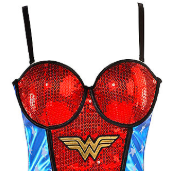We have survived another Halloween. Many of us made it through the wreckage of candy-addled children who went to sleep with chocolate smeared across their faces. Others of us survived the battleground of a whole different war, one that no longer involves attempting to police what our children eat but rather what our children wear. Those of us with teenage girls are on the frontlines of navigating what costumes they choose, how the way they dress make us as adults feel and how the girls themselves perceive their often revealing costumes.
In case you weren’t aware, teenage girls and young women are embracing a new type of feminism in which they proclaim that dressing in extremely revealing clothing is an expression of their self-determination. As young women describe it in blog posts and Instagram photos, clothing choices are their statement that no one should tell young women what to wear because they are in charge of their own bodies and in control of what they do with them. Young women across the country are wearing shorts so short that the bottom curves of their behinds are visible and tank tops so small that they barely cover their areolae. Is that truly empowerment? I don’t know. I will admit, I don’t understand this perspective and more than that, it makes me feel uncomfortable to see young women I know and love dressed in extremely skimpy clothing. I have spent 42 years being socialized by and adhering to the firm boundaries around what clothing is appropriate for girls and women and what isn’t. I have always seen dressing in overtly sexy clothing as cowing to the male gaze, subjugating my own self-worth to conform to societal norms, and these days, to garner Instagram likes. To me, sexy clothing meant undermining my feminism. And yet, as someone who believes in supporting other women, I want to support these burgeoning feminists in their desire to assert their power. So while I don’t understand their position, I will give them the courtesy of showing respect to their new type of feminist argument that dressing like that is empowerment.
However, it is possible as a parent and as a role model to play devil’s advocate to their position and raise some concerns about their costume choices, without placing judgment on the girls. Because if we’re all being honest, our discomfort with having girls dress this way is that we’re afraid for them, for their safety and for their reputations. What we’re all really thinking is: if you dress that way you are in danger of being judged merely as a sexual object, being degraded by people around you, or scariest of all, being sexually assaulted. We know that the society in which we live places the blame squarely on what the girl was wearing rather than the fact that no one, no matter what she’s wearing, deserves to be attacked, assaulted or humiliated. But because so many of still feel powerless in changing a society that blames the victim, we default to the approach that the only way to keep our girls safe is by making sure they appear blameless.
So when you have your next conversation with your teenage daughter about the costume she’s wearing for Halloween or the outfit she’s wearing to a party, here are three things you can say to your daughter that allow you to express your concerns without placing the blame for our broken society on her.
- You can define for yourself why you are choosing to wear that outfit and perhaps it makes you feel powerful to show your body in that way. However, you cannot define how other people perceive that outfit and their perception of you may be the complete opposite of powerful.
- If you choose to wear that outfit, you need to be prepared for how people are going to judge you, what they will say to you and how they will treat you because our society sees women dressed in skimpy clothing in one way – sexually available.
- How do you think it would feel to wear something less revealing? How would your female friends react? How would your male friends react?
This is really just a starting point to having this very difficult conversation. I have much more thinking to do on this topic, but in the meantime, trying approaching this issue with your daughter with curiosity instead of judgment. Allow your daughter to hear your concerns about society and its judgments, but also allow your daughter to express why she is choosing to dress this way. What she says may surprise you.






